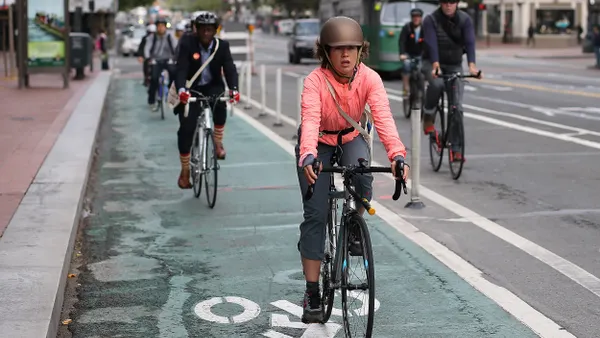Dive Brief:
- Postmates' robotics division has become an independent company, called Serve Robotics, following the parent company's acquisition by Uber, according to a press release. Serve closed its first funding round, led by venture capital firm Neo with participation by Uber as a minority shareholder, Bloomberg reports. The company will continue to service Postmates deliveries.
- Serve will continue to design, develop and operate autonomous delivery robots that navigate sidewalks in urban markets, and will pursue new partnerships. These bots have served thousands of Los Angeles households, according to the press release, after launching in the city in early 2019. Serve also secured the first permit for robot deliveries in San Francisco in August 2019.
- The company claims these bots are even more convenient in pandemic conditions because of the contactless experience they offer. Prior to the pandemic, MarketsandMarkets estimated the delivery robot market would grow from $11.9 million in 2018 to $34 million in 2024.
Dive Insight:
The funding round likely injected a $50 million investment into Serve Robotics, Bloomberg reports. Ali Kashani, who runs Postmates' robot deliveries unit, will lead the new company. Serve will operate with 60 employees in San Francisco to start and be independent from Uber, Bloomberg reports. The company will grow its robot fleet to include thousands of bots, Kashani told the publication.
"Over the next two decades, new mobility robots will enter every aspect of our lives—first moving food, then everything else," Kashani said in the release. He told Bloomberg he believe Serve robots could service 5% of U.S. food deliveries by 2026.
Uber is likely spinning off Serve to take a step closer to profitability — a goal the company wants to reach by the close of 2021. CEO Dara Khosrowshahi has been strategically selling off expensive experimental projects to lighten its load, Bloomberg reports, but is also keeping its foot in the door with these concepts by forming commercial deals with these companies or taking stakes in them so Uber could eventually benefit if they become successful.
The autonomous bots gives Uber Eats/Postmates an added resource in the competitive delivery space as wary diners continue to seek contactless experiences amid the pandemic. According to Serve, nearly 50% of all restaurant deliveries are within a 40-minute walk, which primes delivery robots for opportunity to grow in this space and complete orders at lower costs to consumers.
Rival DoorDash also began using delivery robots in 2019 through a partnership with Starship. Both companies could use this technology to service both restaurant and grocery delivery orders as they work to expand their reach in new markets. In addition, DoorDash recently acquired Chowbotics, a company that makes automated robots that prepare salads, snacks, cereals and parfaits in businesses like universities, hospitals and grocery stores.











